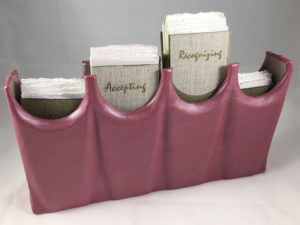
The Business of Love in The Good Woman of Setzuan
By Bailey Anderson '18
ENGL-362: World Literature II
Bailey Anderson’s essay, “The Business of Love in the Good Woman of Setzuan,” demonstrates her remarkable versatility as a writer, her imaginative reach, and her impressive analytical skills. The assignment called for students to select the one work on our syllabus that, in their view, had the most staying power, the one work that could transcend its own historic period, travel through time, and speak most effectively to our present concerns. Bailey chose Bertolt Brecht’s 1940 play, The Good Woman of Setzuan, and her paper reveals the hidden connections between marriage, love, and money: connections, which, as Bailey shows, are still evident today. Her analysis attends to all the complexities of Brecht’s text while also keeping an eye on the big picture of universal human nature. In that way, she shows us the power and relevance of Brecht’s provocative critique of capitalism.
–Michael Harris
Ask anyone what the most important factor in a successful relationship is, and they will likely tell you it is love. However, even people who love each other face challenges which may jeopardize the relationship. Sociological studies suggest that one of these hidden important factors in a relationship is money. Most people marry within their socioeconomic class, and in the instances when they do not, there are common phrases in the public lexicon to address this abnormality: “marrying up” and “marrying down.” In these marriages that cross socioeconomic lines, couples are more likely to fight about money, parenting, leisure time, and marital communication (Streib). They are consequently less likely to stay together. For this reason, love is important, but sociologists seem to suggest that money and socioeconomic class are as well, although they have a somewhat reticent role. Even though the depictions of love and marriage in The Good Woman of Setzuan by Bertolt Brecht might at first seem antiquated, and from some perspectives are, when modern sociologists reiterate the role of money in matchmaking, these issues prove to be more modern than most of us would like to admit. As a key part of Brecht’s critique of capitalist society, love is depicted as a commodity in The Good Woman of Setzuan in different ways, some of which are more socially acceptable than others, and even though there is a growing number of people who believe that love is the most important factor in a marriage, money and socioeconomic class inevitably play a role in the development and success of a relationship.
Love in this play is always seen as a commodity in its capitalist society, but in some cases, the buying and selling of love is seen as more socially acceptable than other forms of barter. For example, as the play begins and the audience first learns about Shen Te’s character, one of the first pieces of information revealed about her is that she is a prostitute. When we first hear her name, Wong refers to her as “Shen Te, the prostitute,” defining her by her profession (2215). He even expresses apprehension about the gods’ knowledge of this fact, and wishes to hide her client from them, “or they’ll know what she is,” again reducing her to her profession (2215). Wong’s desire to hide this from the gods, in an effort to maintain their high opinion of her, shows that even though Shen Te is undoubtedly a good person at heart, she is still defined by the fact that she is a prostitute. In modern society, we tend to see these professions in the same way, often portrayed in movies and television shows as somewhat one-dimensional characters and perpetually defined by their occupation of “selling themselves.” Shen Te, however, discloses to the gods that “I sell myself for a living,” but they still believe that she is the one good person for whom they are looking (2216). It is only the gods who are able to see past Shen Te’s profession to see the good person underneath, and even aid her in escaping the lifestyle that even she loathes by giving her money to open a tobacco shop. Her profession as a prostitute, and the negative reception of this profession on the part of the society as a whole despite her good heart, is in some ways different from how love is portrayed as a commodity in the rest of the play. However, Clare Cross argues that even though the surface motivation for a person to buy the services of a prostitute might be sexual activity, the customer “is likely to be paying, not only for sex, but also for some emotional intimacy and companionship, in other words, at least the illusion of love.” It would be a romanticization to say this is the principal motivation of these clients, but on some level that may not even be clear to the clients themselves, Cross’s assertion is correct. Shen Te’s profession as a prostitute is by far the least socially acceptable example of love as a commodity in The Good Woman of Setzuan.
The play shows the much more positive reception of love in connection with money in several instances, and all of them are concerned with marriage. After receiving the money from the gods and purchasing a tobacco shop, Shen Te worries about being able to pay the rent to a calculating landlady. For this reason, the policeman writes her a marriage advertisement as a means of obtaining money. In this instance, it is clear that marrying someone rich is the best way for a woman, and specifically Shen Te, to obtain money. Effectively, they condone Shen Te once again to sell herself, though in a less direct fashion. Even today, some audiences might refer to marriage as “legalized prostitution,” which reflects the sentiment of Brecht’s play that in a capitalist society, even love can be bought and sold. The policeman, along with everyone else in this scene, jokes to Shui Ta, whom the audience knows is really Shen Te, “We can’t pay six months’ rent, so what do we do? We marry money” (2228). He fails to see his own insistence that Shen Te get married on the same level as Shen Te’s previous profession. He has just denounced her profession, again while addressing Shui Ta, because “love isn’t bought and sold like cigars” (2227). Through the marriage ad, however, he is supporting Shen Te’s selling herself in marriage and even marketing her, which opposes his statement about love and money being separate issues. The marriage ad requests a “respectable man with small capital” and even presents the marriage as an opportunity to invest in a “flourishing tobacco shop,” of course adding a description of Shen Te’s “prepossessing appearance” to increase her desirability (2228). He is taking the liberty of selling her into marriage, so she can attain the six months’ rent. This scene once again places love in the context of money, but in a different and less obvious way than Shen Te’s prostitution at the beginning of the play. It provides an example for the audience of marriage as “legalized prostitution,” which is a phrase still used by some members of the modern audience. It is truly the dark side of marriage. Even when the audience believes it has found one example of love separate from money, it proves not to be the case.
At the beginning of Shen Te’s relationship with Yang Sun, an unemployed pilot, the audience expects it to be more pure and separate from money matters. For Shen Te, it is. She first describes Yang Sun to Wong as a “brave and clever man” instead of referring to him as rich or, as the case may be, poor (2232). She even forgets about the issue of paying the rent on the shop until the old woman asks her about the financial status of her new beau (2235). For her, the love is genuine and unaffected by the money she has to lose or gain in the match. However, the audience soon learns that Yang Sun is simply “selling an illusion of love to Shen Te” (Cross). Shen Te helps Yang Sun to obtain a position as a pilot, and is prepared to follow him to it, but learns he must have 500 silver dollars in order to get the job completely. The only person who has the hope of obtaining the money is Shen Te, and Mrs. Yang convinces her not only to give him the money she was going to put toward the rent but also to sell her entire stock of tobacco in order to pay for the job (2237). Her decision is clearly based on the genuine love she feels for Yang Sun, but it is evident to the audience that the whole relationship is just a ruse so Yang Sun can get the money for his job. Yang Sun confides to Shui Ta that once he has the job, “I’m leaving her behind. No millstones around my neck!” (2240). Yang Sun, the poorer of the pair, is selling himself in marriage to Shen Te so he can get the job he needs and leave her poor and destitute. In this case, the one prostituting himself is Yang Sun, not Shen Te. He refuses to marry her until her cousin, Shui Ta, arrives with the 500 silver dollars. Because Shen Te and her cousin are the same person, Shui Ta never arrives, and they do not complete the transaction. The roles are switched in this scenario, and he is, as a modern audience might say, “marrying up.” After her encounter with Yang Sun, Shen Te begins to understand that love is always something to be bought and sold, and is rarely genuine in her world.

Madison Thingstad, handmade artist’s book, “Cutting your teeth”
In one more major instance, love is portrayed as a commodity, but in this case Shen Te is aware of the role of her love when Mr. Shu Fu writes her a blank check after the termination of he engagement with Yang Sun. He does not explicitly state that the gesture is an act of love, but the audience and the other characters on stage know that Mr. Shu Fu has romantic feelings for Shen Te. Earlier in the play, he began “to suspect I am in love with her” (2235). As he talks with Shen Te about her misfortune regarding Yang Sun and eventually writes her a blank check, he makes no mention of marriage. However, his intentions are easily understood by Shen Te and Mrs. Shin, who happen to be negotiating payment for laundry services. Shen Te does not intend to use the check at all, and insists that she can pay for Mrs. Shin’s services without using Mr. Shu Fu’s gesture of kindness, to which Mrs. Shin replies, “What? You’re not going to cash it just because you might have to marry him? Are you crazy?” (2249). Both women have understood Mr. Shu Fu’s intention to buy Shen Te’s love by his gesture. Shen Te, as someone who has literally sold her sexual love in the past, is disgusted by the idea of marrying a man simply because he is rich, and sees this as a form of “legalized prostitution.” Mrs. Shin, however, is representative of the society in which prostitution is not socially acceptable but marrying for money is accepted and even encouraged in cases like Shen Te’s.
While marrying for money today is less common and less socially acceptable, it is still by far more socially acceptable than prostitution. When Shen Te realizes that she is pregnant, however, Mrs. Shin’s tone changes because the check “wasn’t meant for a christening present” (2250). In other words, now that Shen Te is unmarriageable by society’s standards, it would be imprudent to use the blank check that Mr. Shu Fu meant as a gesture of courtship. Shen Te accepts this as a condition of use of Mr. Shu Fu’s money, but her cold-hearted alter ego Shui Ta does not; he writes out the check for the exorbitant sum of 10,000 silver dollars. Mr. Shu Fu accuses him of theft as a result because he put in all of the risk and did not reap the reward of marrying Shen Te. Again, Mrs. Shin and Mr. Shu Fu have a common vision of love and marriage, which in the play is always connected with money, whereas Shen Te has a somewhat more evolved notion that marriage and money should be separate issues.

Madison Thingstad, handmade artist’s book, “Cutting your teeth”
Shen Te’s attitude toward her pregnancy is one of hope and fear, which might also have to do with Shen Te’s understanding that love in a capitalist society is nothing more than something to be bought and sold. From the beginning, Shen Te is certain that her child-to-be will be a son. Because of her experiences as a woman in this society, it may be attributed to wishful thinking. She has seen women prostituting themselves, women marrying for money instead of love, and women being taken advantage of by men. She has even created a male alter-ego to play the role of the heartless businessman, her cousin Shui Ta, as is necessary in order to succeed in this capitalist society. Men, as she sees it, are the ones doing the buying and women are the ones being sold. Along the same lines, she sees this child as being the one man that will love her without consideration for economics, and fearfully vows to protect him from the cruelty of their world. When Shen Te sees the child of the carpenter digging through the trash for something to eat, she clutches her stomach and sings:
As this is the world my son will enter I will study to defend him. To be good to you, my son, I shall be a tigress to all others If I have to. And I shall have to. (2252)
Any modern parent recognizes that Shen Te is preparing to protect her son from the cruelty of their world at any cost to herself. By her acceptance that in order to do this she must be a “tigress to all others,” she appears to glean strength from the knowledge that, as a mother, her duty is above all to her child, whose love she will hopefully never have to buy. In order to do that, she needs to keep the child away from its alleged father, Yang Sun, who has been a major participant in the buying and selling of love in the rest of the play (2258). This is only one of the reasons she decides to hide behind her other identity of Shui Ta, the other reason being that she wishes to hide her pregnant belly from Setzuan as a whole. Not only does Shen Te intend to make sure her son is a different breed of man than those she has encountered in the past by protecting him from their capitalist society, she also looks forward to enjoying the unconditional love of her son. She hopes to pass on her evolved view of love to her child by keeping it from capitalist appraisals of love.
In The Good Woman of Setzuan by Bertolt Brecht, love is portrayed as a commodity and is often seen in conjunction with some kind of monetary transaction, an issue which is still relevant today as the audience considers the hidden role of money even in modern relationships. While the importance of money tends to be a little more hidden in modern society, to the point where marriages are rarely based on money alone, it is clear that money plays some kind of role, even in romantic relationships based primarily on love. The connection between love and money is much more explicit in the play, but highlights one of the most prominent problems Brecht saw with the capitalist society in which he lived, and something he would undoubtedly still consider a problem in modern capitalist society. Marriages between people from different socioeconomic classes are rare, and those that occur are more likely to fail than those between two partners from the same socioeconomic class. In the play, Brecht compares marrying for money, which is legal, to prostitution, which is not. He wonders why one is socially acceptable but the other is not, and hypothesizes that in a capitalist society, even love is subject to monetization. Money, he argues, should be a separate matter. However, it proves to be a factor in decision-making in relationships even today. Marrying for love is more common now than it was in the time the play was written, but money still plays a hidden role in whom we fall in love with, whom we marry, and ultimately, the success of our romantic endeavors.
Works Cited
Brecht, Bertolt. The Good Woman of Setzuan. The Norton Anthology of World Literature, Volume E, 2nd Edition. Edited by SarahLawall and Maynard Mack. New York: W.W. Norton & Company, 2002. 2213-2267. Print.
Cross, Clare. “Overview of ‘The Good Woman of Szechwan.'” Drama for Students, edited by Ira Mark Milne, vol. 9, Gale, 2000. Literature Resource Center, Accessed 25 Apr. 2017.
Streib, Jessi. “For Richer or Poorer: The Challenges of Marrying Outside Your Class.” The Washington Post. N.p., 26 Mar. 2015. Web. Accessed 28 Apr. 2017.